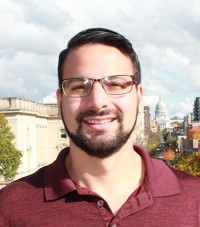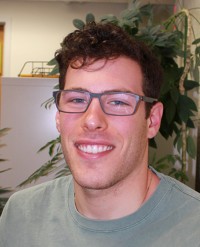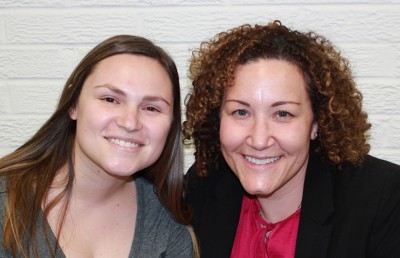EJI Ink Fall 2019 Newsletter
- Director's Welcome
- LIFT Dane Wins National Grant Competition
- EJI in the News & Clinic Updates
- EJI Alumni: Where are they now?
- Student Articles
Making a Gift
Director's Welcome

Mitch, Director of the
Economic Justice Institute,
Neighborhood Law Clinic
Greetings readers. Do you ever feel overwhelmed or confused by the huge amount and conflicting nature of all the information out there? I admit getting that feeling all the time. Sometimes the feeling relates to work: we receive more requests from people who need help than we can serve (who should we help); the matters confronting the people we do serve are multi-faceted and complex (how should we best present their cases). Worse, at times the feeling of being overwhelmed spills over to the home (what should I make for dinner and how should I make it, and which of the millions of shows and books should I watch or read to relax).
If you are reading this, chances are that you are an adult who also faces potentially overwhelming issues every day. I don’t have all the answers, but I do have two things which might help with those feelings. First, a sincere thank you. Thank you for choosing to read this newsletter among all the other things calling for your attention. Second, a promise. In the few minutes it takes to read this edition of EJI Ink, you will learn about many of the great things that EJI clinical faculty and law students have accomplished in the past six months. Reading further will give you an update on LIFT Dane, a fond farewell for Marsha Mansfield, and quick updates on the work of our two newest programs, the Immigrant Justice Clinic and the VOCA Restraining Order Clinic. Most importantly there are short articles from EJI clinical law students who share how they are learning to confront the often-overwhelming demands of practicing law. I do not know how we are going to handle all the demands for legal services that we receive, or even what I am going to cook for dinner tonight, but after seeing that our law students learned how to process complex guardianships, deportation cases, and fast-moving restraining orders, I am reminded that the things which feel overwhelming at first are actually challenges we can meet.
Lift Dane wins National Grant Competition
By Mitch, Director of the Economic Justice Institute, Neighborhood Law Clinic
At a late June event in New York city, in a boardroom overlooking the East River I made a final presentation in the year-long “Alliance for the American Dream” challenge created by the philanthropic organization, Schmidt Futures. This challenge sought collaborative applications for ideas that could increase the income of 10,000 local households by 10%. Hundreds of great ideas came from teams across the country. Our proposal brought together a collaboration between the Economic Justice Institute and the Center for Patient Partnerships at the Law School, Legal Action of Wisconsin, and the Employment and Training Association (EATA) of Dane County. Our proposal is called LIFT (Legal Interventions For Transforming) Dane. The goal of LIFT Dane is to remove barriers to finding and retaining a job through comprehensive “Legal Tune-Ups” that will identify civil legal problems, automate the resolution of those problems with technology; and connect individuals to free legal aid for additional assistance. Following our presentation to Eric Schmidt and a panel of other CEOs, we won! Schmidt Futures committed $1.1 million to LIFT Dane! To read more about LIFT Dane you can visit https://www.liftdane.org/.
Donations to LIFT Dane can be done through this link: https://tinyurl.com/Donate2LIFTDane
Donations made on or before December 31, 2019 will secure additional match funding. For every $10 donated, Schmidt Futures will provide LIFT Dane another $5 in funding.
EJI Clinic Updates & EJI in the news

Marsha Mansfield
Long-time EJI Director Marsha Mansfield retired at the end of August 2019. In 2002, Marsha started working at the Law School as a clinical supervisor for what was then called the Consumer Law Litigation Clinic and the Neighborhood Law Project. In the years since, Marsha made the Economic Justice Institute into what it is today; she created the Family Court Clinic, oversaw the development of the Immigrant Justice Clinic, a Mediation Clinic, the VOCA Restraining Order Clinic, and numerous other programs. In the process she collected the Margo Melli award, the Wisconsin Equal Justice Fund’s Howard Eisenberg Lifetime Achievement Award, the University’s “Distinguished Professor” title, and the enduring respect and admiration of all those who were ever lucky enough to be one of her students or colleagues. In retirement, Marsha will be working part-time with LIFT Dane and getting in some wonderful travel, having already visited the Canadian Rockies and Adirondack Mountains in September and October.
The Family Court Clinic welcomed new director Jennifer Binkley this fall. Attorney Binkley was the director of Community Justice Inc., chairs the Dane County Bar Delivery of Legal Services Committee, and has extensive experience educating law students as law clerks and interns. Please join us in welcoming Jennifer!
The Immigrant Justice Clinic Director Erin Barbato and her clinical law students are on the front lines, helping clients in immigration proceedings in Wisconsin detention centers, Illinois court hearings, and at even taking service trips to the U.S.-Mexico border. While immigration law can be incredibly complex, Erin and her team also take time to break down a lot of the confusion surrounding immigration laws and explains how recent immigration policy changes have impacted people right here in Wisconsin. Erin’s insightful explanations were recently featured in the Wisconsin State Journal and the La Crosse Tribune.
The VOCA Restraining Order Clinic Director Ryan Poe-Gavlinski has been extremely busy since this program began in Spring, 2019. Currently, there are 5 students enrolled in the Clinic this fall. The Clinic continues to assist victims of crime in Dane, Rock, Sauk and Jefferson Counties. In addition to direct services, the Clinic now staff hours on Monday through Friday at the Dane County Courthouse. Students are available to provide walk-ins with information assist with paperwork and answer general questions.
The program, which has recently won the 2019 Legal Innovator award from the state bar, is in its second year of a three-year grant from the Wisconsin Department of Justice. To date, the Clinic has assisted over 50 victims of crime with restraining order issues and continues to seek opportunities to assist more victims.
Students in the current clinic are learning trial skills and trauma-informed lawyering. Our trauma training is necessary since many of our clients are suffering from some form of trauma. Students will also be learning about vicarious or secondary trauma and how to avoid being affected personally through the work they do in the clinic.
EJI Alumni: Where are they now?

Bella Sobah
Bella Sobah was a student with the Neighborhood Law Clinic in the summer of 2018.
What are you doing now?
Currently, I am in my third year of law school and am in the process of applying to the Wisconsin Bar. This year, I am the Vice President of BLSA and one of the Co-Membership Chairs of the Wisconsin Moot Court Team. Additionally, I am the Chair of the Disability Rights Commission for the city of Madison. We recommend policies in areas affecting people with disabilities to the Mayor and City Council, and Department of Civil Rights, as well as study and make recommendations to other city departments, boards, committees, and commission on proposals to provide better access to facilities and services for people with disabilities. Editors note: check out Bella’s insightful comments about the proposed straw ban in this Capital Times Article
How do the things you learned in the clinic impact your current work?
Because we often talked about justice and “access to justice,” I constantly have that in the forefront of my mind whenever I am doing any type of legal work—and even in my non-legal life. It’s extremely important to me that everyone—especially those who have often been pushed to the margins, like people of color, people with disabilities, LGBTQIA+ people, or poor people, have access to justice and so the work I do will always be done through that perspective.
Favorite memorable clinic moment?
My favorite memorable clinic moment—in addition to the great relationships I formed—was being able to attend three court hearings within the first few weeks of clinic and seeing how unpredictable it can be.
Student Articles
Communication Breakdown
By George Acosta, 2L
I helped my client and her son obtain a life insurance payout, overcoming several obstacles along the way. A mom stopped by the Family Court Clinic’s courthouse hours to see if anyone could help her. Marsha Mansfield (former FCC director) happened to be there and felt the clinic should take her on as a client. The case was assigned to me, and I met with her along with an interpreter to see what needed to be done.

George Acosta
Our client who speaks almost no English had been in contact with a life insurance company following the untimely death of her husband. Her husband had a policy for $38,000 with the couple’s son as the sole beneficiary. The claims examiner told our client they could not issue the payment to her nor her son until one of two things occurred: (1) he turned 18; or (2) there was a court-appointed guardian of the estate for him. Because he would not be turning 18 for over a year, we decided to pursue the guardianship of the estate.
Obtaining this order was challenging for several reasons. First, the language barrier was difficult in communicating case updates and action requests. Second, missed meeting times and incomplete responses to requests were barriers I frequently encountered. Third, part of the guardianship process involved setting up a restrictive account at a financial institution for the money to be deposited. Because I had to facilitate technical communications between the client, myself, and the bank, what sounds like a simple process of opening an account became surprisingly difficult. To make matters worse, the financial institution had only one employee who was bilingual, and he was unfamiliar with how to set up the account we needed. After about a month of communication impediments, we were finally able to set up the account. The last issue we faced was when the insurance company told us that they needed a new death certificate, because the one we had did not list a cause of death. Fortunately, we were able to obtain a new one from the state vital records unit without too much extra work. Only after all these steps were completed did the life insurance company finally pay out the policy to our client.
Helping a family who was disadvantaged from the start and under such trying circumstances reflects the important work the FCC clinic does every day. Our client and her son did not know where to turn when the life insurance company told them they could not or would not pay them. And without our help, they likely would not have been able to understand the different legal and technical hoops they needed to jump through in order to get the money they were owed.
The Importance of Representation
By Millan Mauer, 2L

Millan Mauer
Sometimes just showing up is half the battle. That is especially true in removal proceedings when having representation can change the entire course of life. Without an attorney, people without means enter immigration courtrooms across the country without help and without hope. They often don’t speak the same language as the judge in front of them. Without legal representation, people with strong claims for asylum and other forms of immigration relief go unaided and may lose their cases in court.
This summer, I represented a family fleeing persecution and torture because of their political opposition to the Venezuelan government. When they arrived at the U.S./Mexico border in California, they asked for asylum. They were detained and passed an initial interview to assess their “credible fear” of returning to Venezuela before being placed in deportation proceedings. A non-profit in Tijuana, Mexico contacted the Immigrant Justice Clinic as this family was relocating to Wisconsin after release from immigration detention. The Immigrant Justice Clinic decided to represent this family and help them make their asylum claim in court.
Providing representation for people in removal proceedings is a complicated process. People seeking asylum must file an application, which requires gathering information about addresses, jobs, education, and family relationships, as well as describing the persecution they experienced. This is just the beginning. Once the asylum application is filed, the court schedules a date for a full-merits hearing, sometimes many months or years later. Our Venezuelan clients were scheduled for a full hearing a mere six weeks after they first filed their asylum application. This was put on a “fast-track” schedule pursuant to a new policy put in place recently. In this six-week period, we prepared our clients’ affidavits, gathered country conditions reports, wrote our legal brief, tracked down country experts willing to write additional reports and testify in court, a report from a psychologist, and prepared our clients to give testimony about the worst experiences of their lives.
Without legal representation to help them prepare and make their case in court, this family could have easily been deported despite their strong asylum claim. Because of our work at the Immigrant Justice Clinic and ability to represent them, they were ultimately granted asylum and can now remain safely in the United States. Many asylum seekers do not have representation and we hope one day everyone will at least have an attorney representing them.
A Fast and Fantastic Learning Experience
By Chelsea Thibodeaux, 2L
Working with the VOCA Restraining Order Clinic has been the best part of my law school experience so far. It is the first hands-on experience I have gotten outside of class and it reminded me why I wanted to be an attorney in the first place. The majority of people seeking a restraining order are trying to get themselves or someone else out of a dangerous situation. Wisconsin has four different types of restraining orders – domestic abuse, child abuse, harassment and individual at risk. No two restraining order cases will be the same, but cases filed within the same category usually have a similar set of circumstances.

Chelsea Thibodeaux (2L) and VOCA Restraining Order
Clinic Director Ryan Poe-Gavlinski
The nature of restraining orders means that each case moves quickly. If the clinic gets a case at the beginning of the restraining process, we only have two weeks in between the date of filing and the hearing date. In the legal world where cases often last for many months or even years, the two-week start to finish period in restraining order cases can seem like working at a breakneck pace. However, this accelerated timeline creates an accelerated learning experience. I was able to work seven cases from beginning to end during the twelve-week summer session while advising multiple other clients at different stages in the restraining order process. This also presented the opportunity to work with each type of restraining order and to learn the difference between each of the statutes.
The nature of restraining orders also means that we deal with clients who are experiencing a difficult time in their life. As law students we are often disconnected from thinking about “the client” as a real person because we spend most of our time in school focusing solely on learning the law. In order to best represent a client at a restraining order hearing, we have to ask them difficult and personal questions. Learning how to best ask these questions and how to work with clients in difficult situations is not something that is taught in first-year law school classrooms. The opportunity to work with clients and develop these personal-professional skills is the best part of the clinic experience, especially when faced with clients in the restraining order clinic who need assistance and need assistance now.
